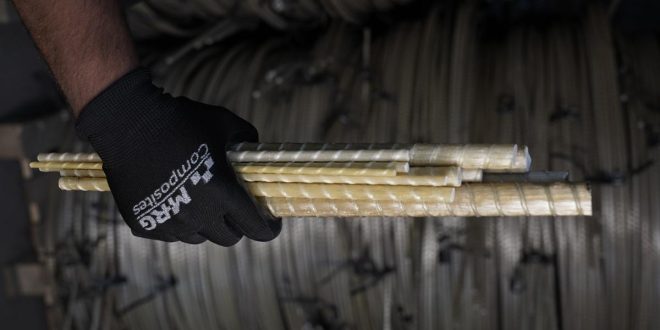Road construction is a crucial aspect of infrastructure development, ensuring the efficient and safe transportation of goods and people. To meet the increasing demands of modern transportation, it is essential to employ materials that offer enhanced durability and sustainability. One such innovative solution is the use of Glass Fiber Reinforced Polymer (GFRP) rebars. In this article, we will explore the benefits and applications of GFRP rebars in road construction.
The Advantages of GFRP Rebars
- Enhanced Durability
GFRP rebars are exceptionally durable and resistant to corrosion, making them an ideal choice for road construction projects. Unlike traditional steel rebars, GFRP rebars do not rust when exposed to moisture and aggressive chemicals commonly found in road environments. This corrosion resistance ensures a longer service life for the reinforced concrete structures, reducing maintenance costs and minimizing the need for frequent repairs.
- High Strength-to-Weight Ratio
GFRP rebars offer a superior strength-to-weight ratio compared to traditional steel rebars. Despite being lighter in weight, GFRP rebars exhibit high tensile strength, providing excellent reinforcement to concrete structures. This advantage allows for easier transportation and installation, leading to improved construction efficiency and reduced labor costs.
- Electromagnetic Neutrality
Another significant advantage of GFRP rebars is their electromagnetic neutrality. Unlike steel rebars, which are conductive, GFRP rebars do not interfere with electromagnetic fields. This property is particularly beneficial in road construction near power lines, railways, or areas sensitive to electromagnetic radiation. By eliminating electromagnetic interference, GFRP rebars contribute to safer and more reliable road infrastructure.
- Corrosion Resistance
As mentioned earlier, GFRP rebars are highly resistant to corrosion, even in harsh environmental conditions. This resistance not only prolongs the lifespan of the reinforced concrete structures but also ensures the structural integrity of the roads. With GFRP rebars, road constructions can withstand the test of time and maintain their performance in diverse climates, including coastal regions with high salt content in the air.
- Sustainability and Environmental Friendliness
In today’s era of sustainable development, GFRP rebars offer a greener alternative for road construction. These rebars are made from recycled materials, including glass fibers and resins, making them an eco-friendly choice. Additionally, GFRP rebars do not release any harmful substances during their production, installation, or service life, further contributing to a healthier environment.
Applications of GFRP Rebars in Road Construction
- Bridge Decks
Bridge decks are exposed to continuous traffic loads and environmental factors, making them vulnerable to deterioration. By utilizing GFRP rebars in the construction of bridge decks, engineers can enhance their durability, reduce the risk of corrosion, and extend their lifespan. Moreover, GFRP rebars are easy to handle and install, speeding up the construction process without compromising on quality.
- Pavements
GFRP rebars are also suitable for reinforcing pavements, including highways, interstates, and local roads. The corrosion-resistant nature of GFRP rebars ensures the long-term integrity of the pavements, even in areas subjected to heavy traffic and harsh weather conditions. The lightweight nature of GFRP rebars simplifies the construction process and reduces the overall weight of the road, resulting in improved fuel efficiency and reduced environmental impact.
- Tunnels
Tunnels demand robust construction materials that can withstand the constant pressure and potential exposure to moisture. GFRP rebars provide an excellent alternative to steel rebars in tunnel construction. Their resistance to corrosion, electromagnetic neutrality, and high strength-to-weight ratio make them an ideal choice for reinforcing tunnel structures. Furthermore, the lightweight property of GFRP rebars facilitates faster installation and reduces the load on the tunnel infrastructure.
4. Road Construction
GFRP Rebar is an ideal choice for road construction. Generally, Roads are used for public transportation. Roads must be good. Road construction requires so many things. You need to plan for road construction. You need to understand the need for road construction and then you need to decide on the road construction type. GFRP Rebar is an ideal choice for construction. GFRP Rebar is corrosion resistant material, It does not corrode and rust. It is compatible with water.
MRG Composite Rebar
MRG Composite Rebar is a leading GFRP Rebar manufacturer in India and supplies all over the world. We provide the best GFRP Rebar price in India and all over the world. GFRP Rebar is the best option for construction.
Steel bars have long been a popular choice in various construction projects due to their strength and durability. However, it’s essential to understand that even with their many advantages, steel bars also have their fair share of disadvantages. In this article, we will delve into the limitations of steel bars, shedding light on the challenges they pose in certain applications.
1. Susceptibility to Corrosion
One of the primary disadvantages of steel bars is their vulnerability to corrosion. When exposed to moisture or chemicals, steel can rust over time, compromising its structural integrity. Corrosion weakens the bars and can lead to structural failures, posing significant safety risks in construction projects. To mitigate this issue, proper protective coatings or alternative corrosion-resistant materials should be considered.
2. High Thermal Conductivity
Steel bars have a high thermal conductivity, which means they can conduct heat and cold rapidly. In certain applications, such as in buildings or bridges exposed to extreme temperature variations, this characteristic can be a disadvantage. The rapid expansion and contraction of steel bars due to temperature changes can lead to stress and structural problems over time. Careful consideration should be given to thermal insulation and expansion joints to minimize these effects.
3. Limited Flexibility
Unlike other construction materials like wood or certain composites, steel bars have limited flexibility. This lack of flexibility can be problematic in structures subjected to dynamic loads, such as earthquakes or high winds. Steel’s rigidity can cause it to crack or fail under extreme forces, making it less suitable for certain applications that require flexibility and resilience.
4. High Cost
Another significant drawback of steel bars is their relatively high cost compared to other construction materials. Steel production involves complex processes, including extraction, refining, and fabrication, which contribute to its price. Additionally, transportation and handling costs can further increase the overall expenses. Consequently, the cost of steel bars may make them less financially viable in certain construction projects with budget constraints.
5. Weight Considerations
While steel bars are known for their strength, their weight can be a disadvantage in some scenarios. The heaviness of steel can pose challenges during transportation, handling, and installation. It may require specialized equipment and skilled labor to maneuver and position the steel bars correctly. Moreover, the weight of steel can impose limitations on the design and load-bearing capacity of structures, potentially influencing architectural and engineering decisions.
6. Environmental Impact
Steel production is resource-intensive and can have a considerable environmental impact. The extraction of raw materials, energy consumption, and carbon emissions associated with steel manufacturing contribute to environmental degradation. As sustainability becomes an increasingly important consideration in construction, alternative materials with lower ecological footprints are being explored as substitutes for steel bars.
Ways To Improve Your Construction Security
Conclusion
GFRP rebars offer numerous advantages for road construction projects, including enhanced durability, high strength-to-weight ratio, corrosion resistance, electromagnetic neutrality, and sustainability. By incorporating GFRP rebars into road infrastructure, we can ensure longer-lasting, safer, and more sustainable transportation networks. With their versatility and proven performance, GFRP rebars have become a game-changer in the construction industry. Embracing this innovative solution will undoubtedly pave the way for a brighter future of road construction worldwide.
 Posting Point
Posting Point

